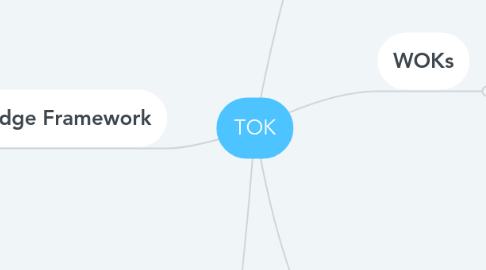
1. Knowledge Framework
1.1. Scope/application
1.1.1. definition of the AOK in terms of subject matter, and the form that an AOK takes depends critically upon the nature of the problems it is trying to answer
1.2. Key concepts and language
1.2.1. language names concepts, and concepts are building blocks for knowledge, allowing it to be passed on to others and accumulated over time for future generations (shared knowledge)
1.3. Methodology
1.3.1. assumptions and values (worth) play an important part in the methodology that underpins the production of knowledge
1.4. Historical developments
1.4.1. conceptual developments and advances made in methodology can change an area of knowledge = our systems are flexible and capable of responding to developments (therefore, provisional knowledge)
1.5. Links to personal knowledge
1.5.1. Links and interactions between shared and personal knowledge
2. Types of Knowledge
2.1. Procedural Knowledge
2.1.1. Know how
2.1.2. Refers to the kind of knowledge we have when we are able to do something
2.1.2.1. Knowing how to write
2.1.2.2. knowing how to solve math
2.1.3. Shared/personal
2.2. Knowledge of facts
2.2.1. Know that
2.2.2. Refers to the kind of knowledge we have about the world
2.2.2.1. the world revolves around the Sun
2.2.2.2. 2+2=4
2.2.3. Shared/personal
2.3. Knowledge by acquisition
2.3.1. Know of
2.3.2. Refers to the kind of knowledge we have based on first-hand knowledge
2.3.2.1. I am sick
2.3.2.2. I like chocolate
2.3.3. Personal
3. AOKs
3.1. Natural Sciences
3.2. Human sciences
3.3. History
3.4. Math
3.5. Arts
3.6. RKS
3.7. IKS
3.8. Ethics
4. WOKs
4.1. Language
4.2. Faith
4.3. Sense perception
4.4. Reasoning
4.5. Memory
4.6. Imagination
4.7. Emotion
4.8. Intuition
5. Beliefs and Truths
5.1. Belief - one's mental representation of the world
5.2. Truth - actual state of the world
5.2.1. Can change over time, some truths can be proven wrong by evidence in the future
